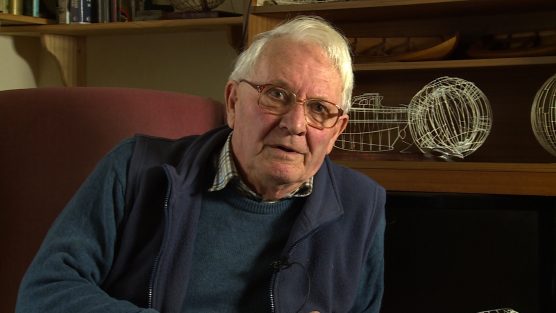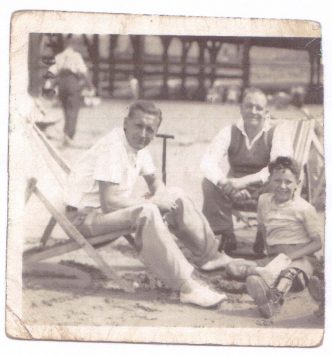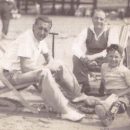Isolation from Family
Ronald Leedham: Lead Soldiers
Ronald Leedham was born in 1929 in India. His family moved back to England in 1931after Ronald contracted Polio. Ronald spent some years in Hospital as a young child after contracting Diptheria. When he was six he returned home to Catford for a short while to live with his father, eventually ending up living in ‘homes for crippled children’ run by the Shaftesbury Society, until he was sixteen.
More from
Ronald Leedham
- Awful Sundays
- The Glow over London
- Shame
- No talking
- Explosives
- Dogfight
- Shut Away and Tipped Out
- Boys and girls together
- War starts
- Visits
- A Miserable Time
- Home
- Mum
- Cricket at Sevenoaks
- The Walk to Church on Sunday
- Suitcases
- ‘Mummy coming’
- Oliver Twist and donk
- Beatings
- Oliver Twist
- Incendiaries in the park
- Greyness
- Sheltering in the Church
- Shelter
- Geography
- Parlour Songs
- I Knew Nothing About Life
- Certificates
- Difficult subject
- Visiting every six weeks
- Buzz Bombs and Doodlebugs
Here Ronald talks about his memories of leaving home and being institutionalised.
https://howwasschool.allfie.org.uk/wp-content/uploads/2013/06/lead-soldiers.mp3
I can remember my dad coming to see me the first day and he bought me a big paper bag full of toy soldiers, lead soldiers. And I remember most of them had broken, but it didn’t matter, my imagination was working, it was beautiful. Erm, but he took me home, was it once or twice? He had time off from work and he took me home for – it was at the most about four or five days, and I had glimpse of what home life was like, because by that time I was thoroughly institutionalised. You know, you didn’t talk when you went down the corridors, there were forty-nine other kids shouting so you shouted. Without knowing it we were becoming self reliant, because we had nobody else. We were self reliant between ourselves because we hadn’t got anybody else to turn to, we didn’t know we could turn to them, and they probably weren’t interested anyway if the truth were known. It was a world, a total world on its own that had no parallel in the world that I’ve seen since, and that doesn’t really bother me because I don’t give a damn for the world that I’ve seen since, I’d sooner go my own way.
Transcript
Obviously the old man couldn’t cope with me on his own and it was the old, old story, obviously. I think part of it was because if you had a disabled child you got rid of it – when I say got rid of it I don’t mean got rid of it, I mean you were put away somewhere to be looked after. And I can remember being taken away one morning with my dad, he was a sorter in the Post Office, was the old man, he had a uniform, and I can always remember him taking me to somewhere, I don’t know where it was and I can remember going up in a very dingy courtyard. Looking back it was like something out of Dickens, bear in mind this was the very early ‘30s, and going up this rickety wooden staircase and walking into a big room that was full of worn out looking people. I’ll always remember that, and screaming kids. And my dad speaking to a woman at a table, a very officious woman you used to get in those days, and handing over pieces of paper and what not, and the next thing I can remember is me being on a coach, a charabanc I suppose they called them in those days, and him standing outside in the rain speaking to me through the window and obviously I didn’t know what he was saying, and, you know, we were all terrified anyway, us youngsters.I can remember my dad coming to see me the first day and he bought me a big paper bag full of toy soldiers, lead soldiers. And I remember most of them had broken, but it didn’t matter, my imagination was working, it was beautiful. Erm, but he took me home, was it once or twice? He had time off from work and he took me home for – it was at the most about four or five days, and I had glimpse of what home life was like, because by that time I was thoroughly institutionalised. You know, you didn’t talk when you went down the corridors, there were forty-nine other kids shouting so you shouted. Without knowing it we were becoming self reliant, because we had nobody else. We were self reliant between ourselves because we hadn’t got anybody else to turn to, we didn’t know we could turn to them, and they probably weren’t interested anyway if the truth were known. It was a world, a total world on its own that had no parallel in the world that I’ve seen since, and that doesn’t really bother me because I don’t give a damn for the world that I’ve seen since, I’d sooner go my own way.
Explore more
Explore stories by theme or view the timeline of significant events in education for disabled people
![How Was School? [logo]](https://howwasschool.allfie.org.uk/wp-content/themes/hws-base-theme/assets/img/allfie-logo-original.svg)





